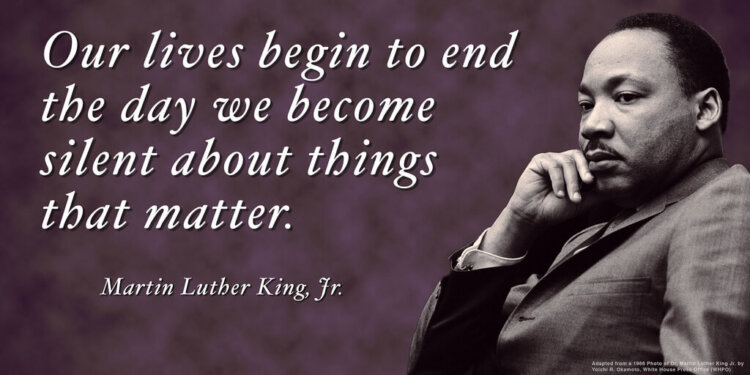
Today marks Martin Luther King, Jr. Day and Civil Rights Day. The Reverend Dr. Martin Luther King, Jr. was a revolutionary leader, a gifted and inspirational speaker, and a spearhead for the Civil Rights movement of the 1960s, which sought to remove the shackles of slavery from African-Americans, who were still being treated as second-class citizens in the United States. Tragically, on April 4, 1968, he was assassinated by James Earl Ray, representing fear, hatred, and bigotry, in outside of his hotel room in Memphis, Tennessee.
At the time that MLK, Jr. and his colleagues were leading the Civil Rights movement, black people were still subject to these injustices:
- Required to drink only from “colored” drinking fountains;
- Blocked from access to schooling with white children;
- Required to remain in separate “colored” seating at restaurants;
- Subject to frequent lynchings, beatings, and abuse by organizations such as the Ku Klux Klan; and
- Suffered from lack of protection and in many cases, institutional abuse, by the police forces and government organizations whose duty it is to protect all people.
My parents were public school teachers in New York, who married in 1961 at the ages of 19 and 21. As the children of Eastern European immigrants and as the first generation rebuilding after the Holocaust – which saw the murder of some 6,000,000 Jews – my parents were among the first-generation Americans who were touched by and intimately involved with the Civil Rights movement. They, along with many other Jewish individuals joined the non-Jewish lovers of civil rights in participating in a nationwide movement to pass the Civil Rights Act and to demand change from the government.
My parents participated in organized sit-ins in the schools they worked in throughout New York city, refusing to move their bodies until the administration would cave to their demands. They did, and my parents taught some of the first classes of integrated children in the history of the United States. What a remarkable thing it must have been to witness and to be a part of; to look into a classroom of children who knew that the color of their skin had nothing to do with their ability to learn together, play together and love together. It was time. It brings tears to my eyes to even think about it.
The Civil Rights movement was the first step towards the acknowledgment that black people deserve to be treated the same as white people. Are they now? No. Will they ever be? Yes, I believe that they will.
As long as we continue to fight for what is right for all people, and as long as we continue to see the mistreatment of any one person as the mistreatment of all people, it can be so.
As long as we continue to see the struggle of black individuals as the struggle of all of us, it is possible. Here’s why:
- When people who are gay or bisexual or transgender are denied rights that are provided for heterosexuals, simply because of their sexual orientation, it is a reminder that the Civil Rights movement is not complete.
- When Muslim people are considered dangerous and in need of being registered just because of their faith, it is a reminder that the Civil Rights movement is not complete.
- When women are assumed to be problematic, hysterical, untrustworthy, unreliable, or unemployable simply because they are women, it is a reminder that the Civil Rights movement is not complete.
These struggles are all separate. Each one has its particular challenges, and living inside one inequality doesn’t mean you understand all inequalities. But they are all related.
Because when we see that the struggle of people we may not agree with is being strangulated by the people who hold the power, not only is it a reminder that the Civil Rights movement is not complete, but it is time to rise up with a purpose and with a consistent plan.
We don’t know exactly what the future will call for us to do. But many of us who have – up until this point – not had to fight for our basic civil liberties may have to take action.
We will have to be prepared to do things that may be uncomfortable. We may have to sit our bodies down in public spaces and refuse to get up. We may have to sit next to people we may not agree with but who have the right to exist as our equals. We may have to prepare to be threatened with imprisonment and with docked pay. We may have to train to walk long distances and learn what it means to pray with our feet, as we walk arm in arm with fellow human beings who have a right to be free.
We may have to look our children in the eyes and tell them that we will fight for a world where they can be who they want, marry who they want, and believe whatever they want to.
Because that’s my America.
Today, my America celebrates the memory of the Reverend Dr. Martin Luther King, Jr. and the men and women who stand for what he died for. And in this time of uncertainty, I am also uncertain as to which actions I am proposing that we take, alone or together. But when there is an action to take, I will be a part of it.
The work of the Civil Rights movement is not yet complete. But I hope that, in the months ahead, we can all be a part of working together toward completing it.
To do now:
- Make a video like this one, saying that “On January 20th, when Donald Trump raises his right hand to take the oath, I am going to raise my right hand to preserve, protect and defend the constitution. Join me. Go to TakeTheOath.US to become a part of the great American Evolution.” After you’ve made your own video, post it on social media. Don’t have access to creating video? Use the text pasted above.
- Stay informed: read a wide variety of sources and make sure you’re not reading “fake news” (read more about “fake news” in this Forbes report)
- Support the ACLU and other organizations that fight for equality and human rights




 Read More From Mayim
Read More From Mayim
Grok Nation Comment Policy
We welcome thoughtful, grokky comments—keep your negativity and spam to yourself. Please read our Comment Policy before commenting.